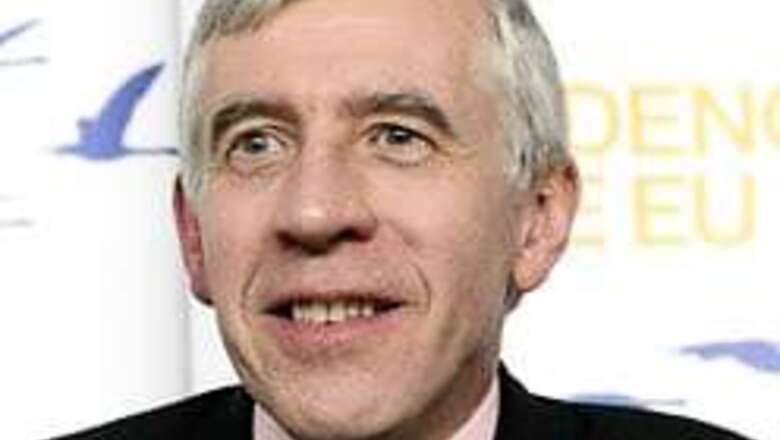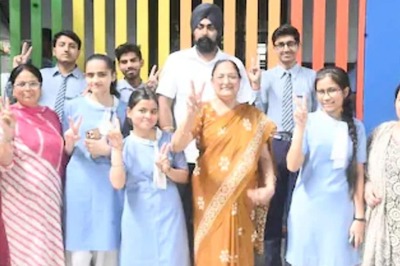
views
London: Britain has been plunged into a debate over Islamic integration after revelations that former Foreign Secretary Jack Straw asks Muslim women visiting his office to remove their veils and a Muslim policeman was excused from guarding the Israeli Embassy.
The uproars have left many questioning whether Britain's multicultural ideals can withstand the strains of a cultural divide that is increasingly tormenting much of Europe.
Straw said in a newspaper column published on Thursday that he believes the veils favoured by some Muslim women inhibit communication and are a sign of division in society. At his constituency office, he said he asks that veiled women reveal their faces, adding that the women have always complied, and a female assistant is always present.
On Friday, British media quoted Straw as going further, saying that he would prefer that Muslim women not wear veils at all.
"I just find it uncomfortable if I'm trying to have a conversation with someone whose face I can't see," Straw told the British Broadcasting Corporation.
Many Muslims in Straw's parliamentary district of Blackburn, in northwestern England, reacted with outrage.
"It is trivial to suggest that you need to see someone's face to speak to them freely. People can still communicate with a veil on," said Fauzia Ali, 23.
Ali, who chooses not to wear a veil, added, "I know some women would refuse to leave the house if they had to remove them."
The Straw controversy erupted just as Britain was abuzz over news that London police had excused a Muslim officer, who is of Syrian descent and has a Lebanese wife, from standing guard at the Israeli Embassy, during the recent Lebanon conflict.
Officials say they excused him because he cited concerns about his family's safety and denied it was religiously or politically motivated.
For decades, Britain has prided itself on a growing multiculturalism.
Workplaces have prayer rooms for Muslim employees to fulfill their daily prayer obligations, Sikh rights to wear turbans are enshrined in law, and Indian curry is practically a national dish.
"We have to respect people's differences and decisions to go their separate ways but everybody in society, too, has got a responsibility toward the cohesion of our society and so I just wanted to put that on the table," Straw told the BBC.
The British model contrasts with France, which outraged many Muslims when it banned headscarves and other religious symbols from public places two years ago.
France's tradition of assimilation came under siege a year ago, when youths in mostly immigrant-populated suburbs ringing Paris went on a three-week rampage, burning cars, smashing windows, and fighting with police.
Many people blamed a system that forced minorities to integrate then kept them out of the top positions in business, politics and media anyway.
PAGE_BREAK
Yet even in Britain, Straw's comments touched a deep nerve.
Last year's London transit attacks caused many people to wonder whether authorities should do more to make immigrant communities conform to the values of the host nation.
Is it right, many asked, to let radical Islamic clerics preach the destruction of the very society that allows them to speak freely? Do traditions such as Muslim veils, which some see as designed to keep women subservient, belong in a democracy that values equality of the sexes?
Prime Minister Tony Blair antagonised many Muslims and scores of people in his center-left support base by taking a harder line on integration, proposing a "Britishness" test among measures to encourage immigrants to accept British values.
In a Thursday column in the Lancashire Telegraph, Straw wrote that "wearing the full veil was bound to make better, positive relations between the two communities more difficult. It was such a visible statement of separation and of difference."
Muslims, mainly from Pakistan and India, make up 19 per cent of the population in Straw's district, compared to 2.8 per cent nationally. Many of those constituents dismissed the notion that Straw might be trying to encourage integration.
"His comments are misjudged and are not helpful in the current climate. Rather than encourage integration, they promote feelings of separation within the community," said Shazia Ahmed, a 19-year-old Blackburn resident.
Still, comments like Straw's are sometimes backed by one group caught in between - Muslims who favor shaking off some traditions.
"This does cause some discomfort to non-Muslims," said Daud Abdullah, of the Muslim Council of Britain, adding that opinion among Muslims about veils was divided.
Baroness Uddin, a Muslim member of the House of Lords, called for a "measured debate" that also considers the status of British Muslim women.
"I think it's about human rights on both sides - Jack's right to say and the women's right to wear what they please," Uddin said.
Some Muslim expressed a sense of being under siege, with the week's events following the uproar over Pope Benedict XVI's citation of a medieval emperor's hostile comments on Islam in September and the August arrest of Muslims accused of plotting to blow up US-bound airliners.
"In the last few months, the discourse has changed and it became an open season to demonise Islam," said Ahmed J Versi, editor of The Muslim News, a free weekly newspaper.




















Comments
0 comment